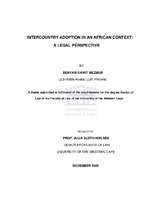| dc.description.abstract | Although it may seem ironic that a policy affecting so few children should engage so
much political and social attention, the symbolic significance of intercountry adoption far
outweighs its practical import. This fact is partly demonstrated by the polarised views on
intercountry adoption, and opinions continue to be divided over the necessity and
propriety of the practice.
At present, there can be few who would quibble with the fact that African children are
attracting an increasing attention from prospective adoptive parents living in other parts
of the world. Celebrity adoptions (the adoptions of Angelina Jolie and Madonna) have
contributed to this increased interest in African children. While intercountry adoption
from African countries is still quite modest compared to adoptions from the top four
countries of origin, there are concrete reasons to believe that interest in adoption from
African countries will continue to increase.
Thus, while Africa is “the new frontier” for intercountry adoption - it is highly
questionable if the continent is equipped to provide its children with the necessary
safeguards in respect of the practice. A central thesis of this study was to explore how
the best interests of the African child can be upheld in intercountry adoption. In
connection with this thesis, a number of related research questions were raised, such
as: does the African context present any peculiar situations that are relevant to
intercountry adoption? Does the African Children’s Charter (ACRWC) add any value to
the provisions of the CRC in addressing African realities relevant for intercountry
adoption? What are some of the challenges, lessons, and opportunities for the
regulation of intercountry adoption on the African continent?
Five themes are considered in dedicated Chapters of this study. They are the African
context; the international legal framework; adoptability; the principle of subsidiarity; and
illicit activities in respect of intercountry adoption. It is argued that context matters, and
there are historical, cultural, social, religious, and legal contexts that are relevant for
intercountry adoption in Africa. Since human rights issues are at the core of the current
debate over intercountry adoption, international children’s rights law is also very crucial
for the discussion.
Four countries (Ethiopia, Kenya, Malawi and South Africa) are used in this study in
supplementary fashion to demonstrate African countries’ experiences. The study
identifies the role of various stakeholders for the promotion and protection of children’s
rights in Africa in respect of intercountry adoption. It is concluded that as a
predominantly sending continent, Africa’s views on intercountry adoption issues should
be seriously considered and taken into account, if a socially and legally sound, and
child-centred, intercountry adoption regime is to be formed on the continent. | en_US |

